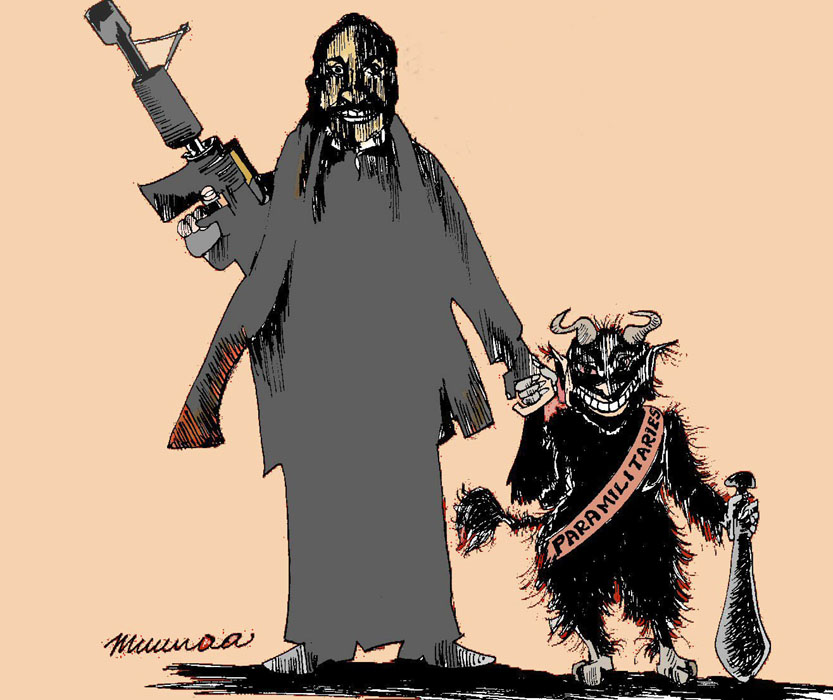 |
A secret US embassy cable Wikileaked Thursday outlines in detail how the US was well aware in 2007 of the extent of Sri Lanka’s active use of Tamil paramilitaries as an integral part of its war against the LTTE.
Sri Lanka funded paramilitaries directly, then allowed them to extort funds, loot supplies for internally displaced Tamils, and run forced prostitution rings using girls and women from the refugee camps.
However, Tamil voices who argued at the time that the soaring killings, extortion and crime were linked directly to Sri Lanka's paramilitary-led war against the LTTE were largely ignored.
For example, compare what one of our columnists wrote on the subject in January 2008, with the US cable of May 2007:
“The current pattern of human rights violations reflects the new dynamics of war. Abductions and extortions of Tamils in Colombo, Jaffna and the East are a consequence of this government's greater reliance on paramilitary groups. These acts are carried out by army backed groups and the ransom money is used to fund paramilitary activities, mainly in the East. Tamil politicians are being assassinated to clear the space for paramilitary politicians.
“These activities cannot be explained in terms of the anti human rights tendencies of [paramilitary leaders] Douglas, Pilliyan or Karuna alone. Rather abductions in Colombo are fuelling paramilitary activities in the east, precisely so as to free up the army to capture the north.
"Abductions [of Tamils for ransom] were not a major feature of Chandrika's regime as [focused on the north] she did not need a large paramilitary group to control and pacify the east and could fund paramilitaries like the EPDP in the north through the ministries channeling the generous financial assistance given to redevelop military-controlled Jaffna.”
This is what US Ambassador Robert Blake cabled Washington in May 2007:
“The GSL has a history of funding paramilitary groups. … [U]nder former President Kumaratunga, the GSL had begun the practice of paying paramilitaries to refrain from engaging in criminal pursuits. Several Embassy interlocutors have independently confirmed this. However, …. the current [Rajapaksa] government, cash-strapped, has ended this arrangement. Instead, … Defense Secretary Gothabaya Rajapaksa has authorized EPDP and Karuna to collect the money from Tamil businessmen. This may account for the sharp rise in lawlessness, especially extortion and kidnapping, that many have documented in Vavuniya and Colombo. Even though EPDP and Karuna are each comprised nearly exclusively of ethnic Tamils, the crimes that they commit are almost always against other Tamils.”
“The GSL sees several advantages in allowing paramilitary groups to operate in the country. Paramilitary groups in the North and East help the GSL fight the LTTE and compete with the LTTE for public support and new recruits. These groups also enhance security in Colombo by kidnapping and sometimes killing those suspected of working with the LTTE. Frequent abductions by paramilitaries keep [Tamil] critics of the GSL fearful and quiet. Ultimately, the GSL's objective is to turn [TMVP leader] Karuna and EPDP leader Douglas Devananda into pro-GSL political leaders in the East and North.
"In the meantime, these paramilitary groups give the GSL a measure of deniability."
Notably, international ceasefire monitors (the SLMM) did not accept, until the ceasefire had almost fallen apart, that the state was behind the killings and abductions in government-controlled areas of LTTE political officials and civilians who expressed support for self-determination or Tamil Eelam. (See, for example, our editorial of 14 June 2006).
However, the monitors and other international actors and media, routinely described the LTTE's counter-attacks on Tamil paramilitaries as killings of "Tamils opposed to the LTTE."
In the context of Ambassador Blake's cable above, see especially our editorial of 1 August 2007 (just three months earlier), in which we argued:
"The confidence with which international actors are preparing to fund development in the newly captured east is misguided. ... The fundamental problem is clearly visible in Sri Lanka today: the military is carrying out rights abuses at will and with impunity - even though the international community has a grandstand view."
